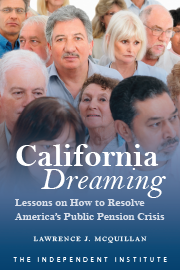The World Cup kicks off on Nov. 20 in Qatar, and a record 5 billion people are expected to watch. Fans may be unaware that the month-long tournament does measurable harm to global economic output because the games capture the time and attention of countless business owners, managers, and employees. But governments can dampen the loss by adopting policies that advance economic freedom and human progress.
Two economists have used statistical tools to measure the World Cup’s impact on the annual growth of per-capita gross domestic product (GDP) in 185 countries from 1950 through 2004. The finals, which feature 32 national teams, are played every four years, and the researchers found about a 0.75 percentage point decline in worldwide inflation-adjusted average GDP growth in those years. This reduction is the “price” people “pay” for the enjoyment of watching the tournament. But this cost is not shared equally.
People in some countries are more interested in soccer generally, and the World Cup specifically, than residents of other countries. Also, some countries have teams that advance further in any given year and consistently across years. Those factors concentrate spectator interest and associated output losses in certain countries and on specific continents.
The economists found that countries in Europe, South America, and North America experience the largest average declines in GDP growth in World Cup years. Individual countries in South America, where the aggregate effects are largest, experience an average decline in GDP growth of 0.9 percentage points in World Cup years, plus another 2.1-point reduction if its national team qualifies for the finals, another 4.1-point reduction if its team plays in the championship game, and another 4.5-point reduction if the country hosts the finals.
Given those effects, output growth can easily turn negative in countries like Argentina and Brazil, where both fan interest and tournament success are strong. But governments can adopt policies that counter the reduction in GDP growth in World Cup years and beyond.
The favorites to win the 2022 World Cup are Brazil, defending champion France, Argentina, and England. None of those countries has the best policies to encourage entrepreneurship, optimal investment, low inflation, and strong income growth, according to the Economic Freedom of the World report. Each year that report assesses the economic policies and institutions of 165 countries. Policies that advance economic freedom and income growth include lower tax rates, protection of private property rights, impartial courts, stable money, market-determined interest rates, low barriers to international trade, and low government hurdles to starting and operating businesses and to hiring and managing employees.
According to the newly released 2022 report, England (UK) ranks 22nd in economic freedom, France 54th, Brazil 114th, and Argentina a dismal 161st, or fifth-worst. Venezuela, which has a corrupt authoritarian socialist government, places dead last.
If economic freedom was expanded by cutting restrictive union rules, eliminating occupational licensing laws, or ending minimum-wage requirements, output may not decline in World Cup years due to greater freedom to time-shift work or change staffing decisions. In the long run, when a country’s economic freedom improves from the lowest 25 percent to the highest 25 percent, income per capita jumps by seven times, life expectancy increases by 14 years, the infant mortality rate drops by 87 percent, school enrollment surges, and overall happiness improves.
People worldwide will enjoy the beautiful game this World Cup season, and a champion will be crowned on Dec. 18. But this enjoyment will come at a price. In the years to come, governments should lessen this price and score long-term wins for the people by adopting policies that increase economic freedom, personal income, and human flourishing.










